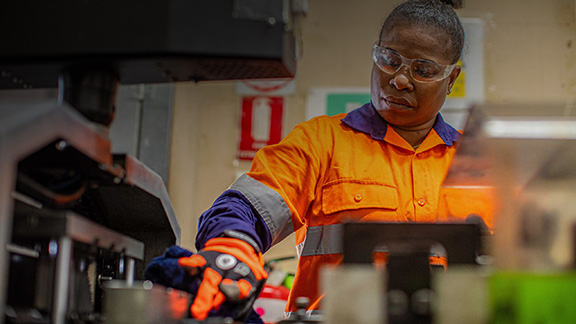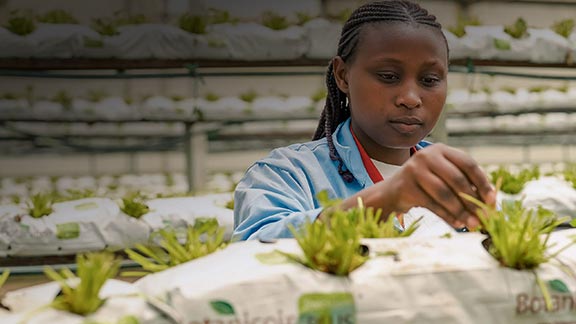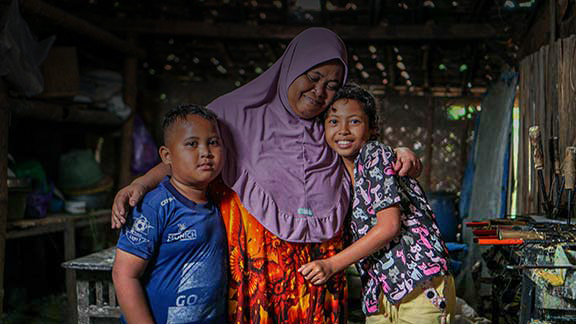
Photo of IFC Executive Directors
Seated (left to right): Parameswaran Iyer, India | Abdulaziz Al Mulla, Kuwait | Ernesto Acevedo, Mexico | Felice Gorordo, United States (Alternate Executive Director) | Vel Gnanendran, United Kingdom | Matteo Bugamelli, Italy (Dean) | Junhong Chang, China (Co-Dean) | Dominique Favre, Switzerland | Ayanda Dlodlo, South Africa | Abdoul Salam Bello, Niger | Arnaud Buissé, France
Standing (left to right): Daniel Pierini, Argentina | Lene Lind, Norway | Katharine Rechico, Canada | Suhail Saeed, Saudi Arabia | Michael Krake, Germany | Marcos Chiliatto, Brazil | Hideaki Imamura, Japan | Floribert Ngaruko, Burundi | Il Young Park, Korea (Republic of) | Hayrettin Demircan, Türkiye | Wempi Saputra, Indonesia | Eugene Rhuggenaath, Netherlands | Roman Marshavin, Russian Federation | Tauqir Shah, Pakistan
In fiscal 2024, the World Bank Group Boards of Executive Directors supported the institution’s ongoing efforts to become a better Bank. These operational enhancements are both timely and necessary: While economic growth prospects for the near term have improved slightly, easing fears of a global recession, the post-pandemic recovery remains weak in many developing countries, and pre-existing social stresses endure. The world is increasingly unlikely to achieve the 2030 Sustainable Development Goals, and climate change, biodiversity loss, and escalating geopolitical tensions further threaten development. To help countries address these intertwined challenges, the World Bank Group committed $117.5 billion (including $37.6 billion from IBRD, $31.2 billion from IDA, $31.7 billion from IFC, $8.2 billion from MIGA, and $8.9 billion in recipient-executed disbursing activities) in fiscal 2024.
The 2023 Annual Meetings marked an important milestone for the World Bank Group as Development Committee members endorsed the institution’s new vision of a world free of poverty on a livable planet. Since then, the Bank Group has implemented core reforms to build a better Bank, including enhancing its financial capacity; reinforcing its emphasis on results; and improving its operational effectiveness and efficiency. The Bank Group has also developed a new Scorecard and crisis preparedness and response tools; launched the Global Challenge Programs and World Bank Group Guarantee Platform; developed a Knowledge Compact; forged four new partnerships (with the Asian Infrastructure Investment Bank, the European Bank for Reconstruction and Development, the Inter-American Development Bank, and the Islamic Development Bank); and streamlined the implementation of the World Bank’s Environmental and Social Framework.
Executive Directors commend the Bank Group’s commitment to devote 45 percent of annual financing to climate action by 2025, deployed equally between mitigation and adaptation. IFC and MIGA will intensify efforts to boost private sector financing for climate adaptation. Executive Directors also applaud the Bank Group’s 2030 commitments to provide electricity access to 300 million people in Africa in partnership with the African Development Bank and to provide quality, affordable healthcare to 1.5 billion people.
The Bank Group is enhancing its financing model to create safer, more prosperous communities in low-income countries. Since the 2023 Annual Meetings, the Bank Group has raised funds for the IDA Crisis Facility and maintained IDA’s financial capacity of $30 billion per year for fiscal 2024 and 2025. Bank Group management has proposed enhancements to IDA’s Capital Adequacy Framework that are expected to expand IDA’s financing by $20 billion through fiscal 2037. Executive Directors anticipate the funding generated by these measures, coupled with strong donor contributions for the December 2024 IDA replenishment, will improve lives and equip nations to tackle immediate crises and long-term development goals. Beyond financing, achieving these goals requires the unwavering commitment of current and new donors, client countries, and the World Bank.
IBRD has made significant progress in enhancing its financial capacity while continuing to protect its triple-A rating and long-term financial stability. New financial instruments — such as hybrid capital, a portfolio guarantee platform, and the Livable Planet Fund — have been approved, and contributions have already been pledged by some Bank Group shareholders. The Board recently approved the Framework for Financial Incentives, which will encourage IBRD countries to boost investments in global challenges with cross-border impact. Progress has been made toward enhancing the value of callable capital. In addition, IFC and MIGA are expanding their investment and guarantee offerings, including new instruments to mobilize private capital. Executive Directors look forward to the further operationalization of the Loss and Damage Fund, which is expected to be a significant resource in assisting developing nations affected by natural disasters linked to climate change.
Executive Directors welcome the Bank Group’s deepening partnerships with multilateral development banks and the private sector. The One World Bank Group Partnership Charter, published in May 2024, highlights the principles that define our work with partners and restates our vision of the partner we aspire to be. The Private Sector Investment Lab, launched in June 2023, is working to address the barriers preventing private sector investment in emerging markets.
Through travel to several client countries this year, Executive Directors witnessed the Bank Group’s impact firsthand. During trips to Saudi Arabia (December 2023); China, Fiji, and Samoa (January–February 2024); Kazakhstan, Kyrgyz Republic, and Tajikistan (March 2024); and Kenya and Estonia (May 2024), Board members engaged with key government officials, private sector representatives, Bank Group staff, beneficiaries of Bank Group operations, donors, and other pertinent stakeholders.
Looking ahead to fiscal 2025, the Executive Directors and management remain committed to sharpening the Bank Group’s approach to better serve people in low-income countries. The Executive Directors extend their gratitude to Ajay Banga for his leadership in spearheading the evolution of the Bank Group, and sincerely thank all staff across the institution for their continued hard work and unwavering commitment to the mission of ending poverty on a livable planet.




